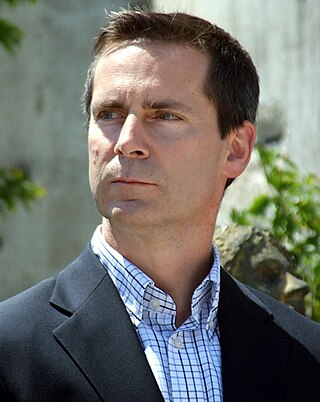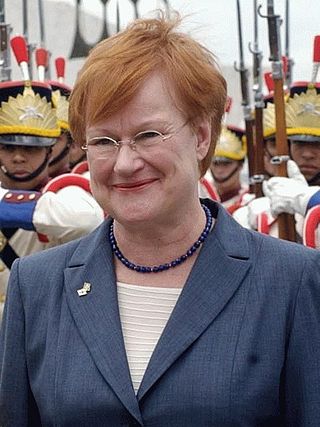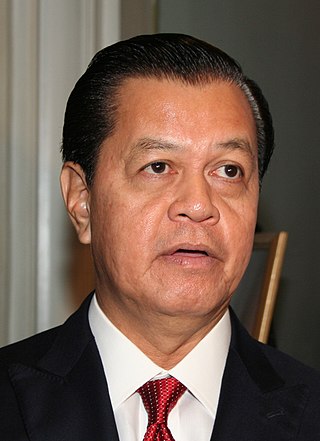Related Research Articles
An opinion poll, often simply referred to as a survey or a poll, is a human research survey of public opinion from a particular sample. Opinion polls are usually designed to represent the opinions of a population by conducting a series of questions and then extrapolating generalities in ratio or within confidence intervals. A person who conducts polls is referred to as a pollster.
A straw poll, straw vote, or straw ballot is an ad hoc or unofficial vote. It is used to show the popular opinion on a certain matter, and can be used to help politicians know the majority opinion and help them decide what to say in order to gain votes.
An election exit poll is a poll of voters taken immediately after they have exited the polling stations. A similar poll conducted before actual voters have voted is called an entrance poll. Pollsters – usually private companies working for newspapers or broadcasters – conduct exit polls to gain an early indication as to how an election has turned out, as in many elections the actual result may take many hours to count.

The 2007 Ontario general election was held on October 10, 2007, to elect members (MPPs) of the 39th Legislative Assembly of the Province of Ontario, Canada. The Liberals under Premier Dalton McGuinty won the election with a majority government, winning 71 out of a possible 107 seats with 42.2% of the popular vote. The election saw the third-lowest voter turnout in Ontario provincial elections, setting a then record for the lowest voter turnout with 52.8% of people who were eligible voted. This broke the previous record of 54.7% in the 1923 election, but would end up being surpassed in the 2011 and 2022 elections.

The Venezuelan recall referendum of 15 August 2004 was a referendum to determine whether Hugo Chávez, then President of Venezuela, should be recalled from office. The recall referendum was announced on 8 June 2004 by the National Electoral Council (CNE) after the Venezuelan opposition succeeded in collecting the number of signatures required by the 1999 Constitution to effect a recall. The result of the referendum was not to recall Chávez.

The 2004 Philippine presidential and vice presidential elections were held on Monday, May 10, 2004. In the presidential election, incumbent president Gloria Macapagal Arroyo won a full six-year term as President, with a margin of over one million votes over her leading opponent, movie actor Fernando Poe Jr.
During the 2004 United States elections, concerns were raised about various aspects of the voting process, including whether voting had been made accessible to all those entitled to vote, whether ineligible voters were registered, whether voters were registered multiple times, and whether the votes cast had been correctly counted. More controversial was the charge that these issues might have affected the reported outcome of the presidential election, in which the incumbent, Republican President George W. Bush, defeated the Democratic challenger, Senator John Kerry. Despite the existing controversies, Kerry conceded the election the following day on November 3.

Presidential elections were held in Finland on 15 and 29 January 2006 which resulted in the re-election of Tarja Halonen as President of Finland for a second six-year term.

"Shy Tory factor" is a name given by British opinion polling companies to a phenomenon first observed by psephologists in the early 1990s. They observed that the share of the electoral vote won by the Conservative Party was significantly higher than the equivalent share in opinion polls. The accepted explanation was that so-called "shy Tories" were voting Conservative after telling pollsters they would not. The general elections held in 1992 and 2015 are examples where it has allegedly affected the overall results, but has also been discussed in other elections where the Conservatives did unexpectedly well. It has also been applied to the success of the Republican Party in the United States or the continued electoral victories of the People's Action Party in Singapore.

Parliamentary elections were held in Greece on Sunday, 16 September 2007 to elect the 300 members of the Hellenic Parliament. The leading party for a second term was New Democracy under the leadership of Kostas Karamanlis with 42%, followed by George Papandreou and PASOK with 38%. New Democracy managed to secure an absolute but narrow majority of 152 out of 300 seats in parliament. The populist Popular Orthodox Rally entered the parliament for the first time with 10 seats, while the parties of the left, the Communist Party of Greece (KKE) and Syriza, enjoyed a significant increase in their vote share. KKE received 8% of the votes and won 22 seats, while Syriza received 5% of the votes and 14 seats.
Rasmussen Reports is an American polling company founded in 2003. The company engages in political commentary and the collection, publication, and distribution of public opinion polling information. Rasmussen Reports conducts nightly tracking, at national and state levels, of elections, politics, current events, consumer confidence, business topics, and the United States president's job approval ratings. Surveys by the company are conducted using a combination of automated public opinion polling involving pre-recorded telephone inquiries and an online survey. The company generates revenue by selling advertising and subscriptions to its polling survey data.

The Bradley effect is a theory concerning observed discrepancies between voter opinion polls and election outcomes in some United States government elections where a white candidate and a non-white candidate run against each other. The theory proposes that some white voters who intend to vote for the white candidate would nonetheless tell pollsters that they are undecided or likely to vote for the non-white candidate. It was named after Los Angeles mayor Tom Bradley, an African-American who lost the 1982 California gubernatorial election to California attorney general George Deukmejian, a white person, despite Bradley being ahead in voter polls going into the elections.
An election verification exit poll (EVEP) is a relatively new concept in polling, intended to improve the accuracy of exit polls to such an extent that they can be used to verify election results. Traditional (media) exit polling relies on small samples, wheres EVEPs propose to use larger samples.

Presidential elections, legislative elections and local elections were held in the Philippines on May 10, 2004. In the presidential election, incumbent president Gloria Macapagal Arroyo won a full six-year term as president, with a margin of just over one million votes over her leading opponent, highly popular movie actor Fernando Poe Jr.
This page lists the public opinion polls that were conducted in relation to the 2014 Scottish independence referendum, that was held on 18 September 2014. Overall, polls showed that support for a "No" vote was dominant until the end of August 2014, when support for a "Yes" vote gained momentum and the gap closed significantly, with at least one poll placing the "Yes" vote ahead. In the final week of the campaign, polls showed the "No" vote to be consistently but somewhat narrowly ahead. There were no exit polls although a YouGov post-election poll was published shortly after the polls closed. For the history of the campaign itself see 2014 Scottish independence referendum, Yes Scotland, and Better Together (campaign).

The referendum on EU membership took place on 23 June 2016. Opinion polling for the United Kingdom European Union membership referendum was ongoing in the months between the announcement of a referendum and the referendum polling day. Polls on the general principle of the UK's membership of the European Union were carried out for a number of years prior to the referendum. Opinion polls of voters in general tended to show roughly equal proportions in favour of remaining and leaving. Polls of business leaders, scientists, and lawyers showed majorities in favour of remaining. Among non-British citizens in other EU member states, polling suggested that a majority were in favour of the UK remaining in the EU in principle, but that a similarly sized majority believed that if the UK were only able to remain in the EU on renegotiated terms then it should leave.
Opinion polling on Scottish independence is continually being carried out by various organisations. This article concerns well over 240 polls carried out since the 2014 Scottish independence referendum. Polling conducted before the referendum can be found here. Polls listed here, except as noted, are by members of the British Polling Council (BPC) and abide by its disclosure rules.
Voter segments in political polling in the United States consist of all adults, registered voters, and likely voters.

"None of the Above" has been provided as an option to the voters of India in most elections since 2009. By expressing a preference for none of the above, a citizen can choose not to vote for any candidates who are contesting the elections.
Following the referendum in the United Kingdom on its membership of the European Union on 23 June 2016, polling companies continued to use standard questions in order to gauge public opinion on the country's relationship with the EU. Opinion polling overall showed an initial fall in support for Brexit from the referendum to late 2016, when responses were split evenly between support and opposition. Support rose again to a plurality, which held until the 2017 general election. Since then, opinion polls tended to show a plurality of support for remaining in the EU or for the view that Brexit was a mistake, with the estimated margin increasing until a small decrease in 2019. This seems to be largely due to a preference for remaining in the EU among those who did not vote in 2016's referendum. Other reasons suggested include slightly more Leave voters than Remain voters changing how they would vote and the deaths of older voters, most of whom voted to leave the EU.
References
- ↑ "Campaigns and Elections". Archived from the original on 2016-11-17. Retrieved 2016-11-17.